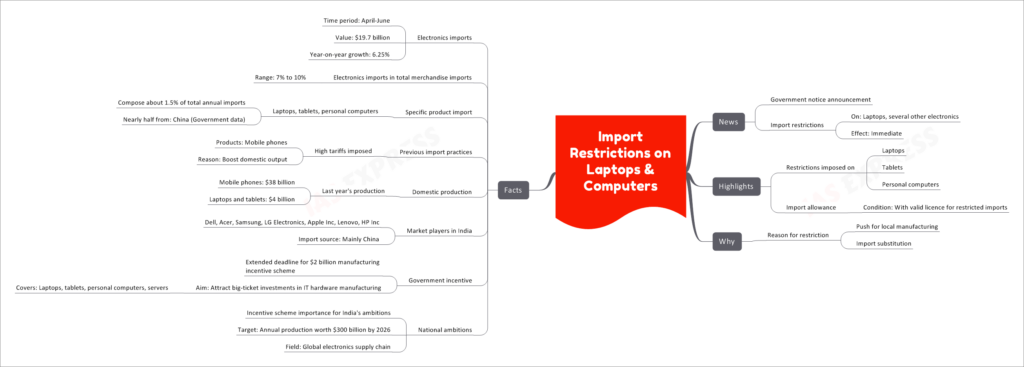Import Restrictions on Laptops & Computers

In recent news, the government of India has announced immediate import restrictions on laptops, tablets, and personal computers. This move comes as a part of the country’s push for promoting local manufacturing and import substitution in the electronics sector.
Highlights of the Import Restrictions
The import restrictions apply to the following products:
- Laptops
- Tablets
- Personal computers
Importing these electronics will now require a valid license for restricted imports, making it more challenging for foreign manufacturers to enter the Indian market.
Reasons for the Restrictions
The government has imposed these import restrictions with two primary objectives:
- Push for Local Manufacturing: By restricting imports, the government aims to encourage domestic production of laptops and computers. This move is part of a broader effort to boost the country’s manufacturing capabilities and reduce dependence on imports.
- Import Substitution: Restricting the import of laptops and computers is an attempt to promote domestic alternatives and encourage consumers to buy locally manufactured products instead of foreign ones.
Facts and Figures
Electronics Imports
- During the period from April to June, electronics imports amounted to $19.7 billion, with a year-on-year growth of 6.25%.
- Electronics imports make up around 7% to 10% of India’s total merchandise imports.
- Laptops, tablets, and personal computers together constitute about 1.5% of the country’s total annual imports in the electronics sector.
- Almost half of these imports come from China, as per government data.
Previous Import Practices
- The government previously imposed high tariffs on mobile phones to promote domestic output and reduce reliance on imports.
Domestic Production
- In the previous year, India’s domestic production of mobile phones reached $38 billion, while laptops and tablets manufacturing amounted to $4 billion.
Market Players and Import Source
- Major market players in India’s electronics sector include Dell, Acer, Samsung, LG Electronics, Apple Inc, Lenovo, and HP Inc.
- The primary import source for these electronics products is China.
Government Incentive
- The government has extended the deadline for a $2 billion manufacturing incentive scheme aimed at attracting big-ticket investments in IT hardware manufacturing, including laptops, tablets, personal computers, and servers.
National Ambitions
- The incentive scheme holds significant importance for India’s ambition of achieving annual production worth $300 billion by 2026 in the global electronics supply chain.
Conclusion
The import restrictions on laptops and computers reflect the Indian government’s commitment to boost local manufacturing and promote domestic production in the electronics sector. By limiting imports and encouraging investments through incentive schemes, India aims to strengthen its position in the global electronics market and reduce its dependence on foreign imports. As the country moves forward with its ambitious target for domestic production, it is likely to witness significant changes in the electronics landscape and contribute to the growth of the Indian economy.
If you like this post, please share your feedback in the comments section below so that we will upload more posts like this.

